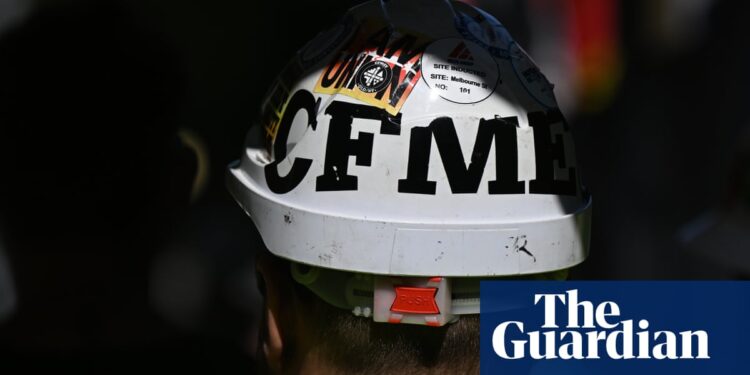Former construction union officials challenging the government’s law putting the union into administration will get their day in the high court as early as November, after the court agreed to expedite the case.
On Friday, the acting chief justice, Michelle Gordon, ordered a timetable that will allow the case to be heard this year after the plaintiffs argued the law prevented them giving political donations and campaigning ahead of the federal election, due by May 2025.
Sacked Queensland and Northern Territory construction secretary, Michael Ravbar, and former assistant secretary, William Kane Lowth, are arguing the law breaches the implied freedom of political communication.
That is because the law “has an impugned purpose of limiting or preventing” the construction union from making political donations, incurring expenditure and engaging in political communication.
Court documents, seen by Guardian Australia, note the Coalition helped pass the bill in part because of a letter from the prospective administrator, Mark Irving, indicating he intended for the union not to promote candidates or make donations.
In submissions arguing for the case to be expedited, lawyers had said the case “involves pressing consequences” for the plaintiffs.
The construction union “intended to be involved – by way of advocacy, support of political parties, incurring electoral expenditure and making political donations – before and during the next federal election” which it can only do if the case is heard “expeditiously”.
The government has said it will defend the case, and believes its law is constitutionally sound.
Fallout from the Albanese government’s decision to team up with the Coalition to pass special legislation continues, with the Communications Electrical Plumbing Union deciding on Thursday to disaffiliate from the peak union body and proposing to set up an alternative grouping for blue collar unions.
Allen Hicks, the New South Wales and ACT secretary of the Electrical Trades Union, said that given the ACTU had supported special laws to put the construction union into administration it is clear the “CEPU doesn’t align with the ACTU at this point in time”.
The CEPU, which represents 100,000 workers, has proposed that blue-collar unions including metalworkers and construction union representatives should hold a summit within three months to discuss forming an alternate union grouping. Together this grouping represents at least 250,000 workers.
Hicks said that blue collar construction unions needed “a peak body to represent all unions, not just the select few”.
Troy Gray, the ETU Victorian secretary, said the vote was “overwhelming” although not unanimous. He accused the ACTU of representing “white collar unions”.
Gray said blue-collar unions “didn’t want to take our bat and ball and go home” and had decided it was more responsible to propose an alternative after disaffiliation, citing the US and UK as examples of other jurisdictions with different peak bodies.
On Friday a news report speculated that the ETU might give a political donation to the Greens, although no decision has been taken and some officials regard the Greens as a poor fit due to their position on some social issues of interest to members.
Asked if a new blue-collar union grouping would campaign in the election or donate to other parties, Hicks said: “We need to have political influence, whether that’s over the Labor party, independents, minority parties – we must be able to seek to influence political outcomes.”
The ACTU president, Michele O’Neil, responded to the CEPU disaffiliation in a statement: “It’s always in the interest of workers to come together collectively within unions, and then to have unions act together improve pay and conditions and rights and safety for workers and that’s what we do.”







